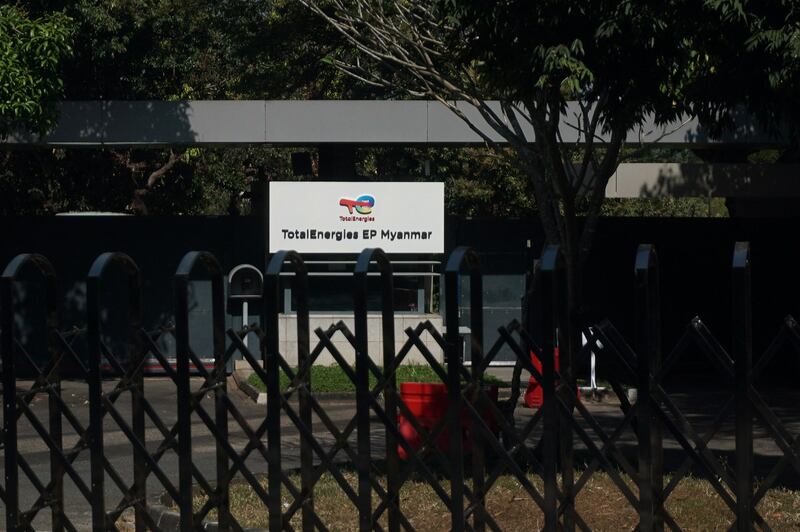An exodus by international energy companies in response to concerns over repressive military rule in Myanmar, coupled with EU sanctions on a key junta-controlled oil and gas firm, is expected to reduce the regime’s tax revenue to a trickle and threaten its grasp on power.
Thirteen months to the day that the military seized power from Myanmar’s democratically elected National League for Democracy (NLD) in a Feb. 1, 2021, coup, the country is facing an existential crisis, observers said Tuesday. Authorities have arrested more than 9,430 people and killed nearly 1,590 – mostly while cracking down on peaceful anti-coup protests. The junta, meanwhile, has ignored calls to end violence in the country, prompting condemnation and sanctions from the global community.
In addition to the general turmoil, junta mismanagement has left Myanmar’s economy in shambles and foreign investment is flowing out of the country. Since December, five major players in the country’s key energy sector have announced their departure, including France’s Total, U.S.-based Chevron, Australia’s Woodside, Japan’s Mitsubishi and Malaysia’s Petronas. And on Feb. 21, the EU announced it is adding the junta-controlled Myanmar Oil and Gas Enterprise (MOGE) to its sanctions list, citing the situation in the country.
Speaking to RFA’s Myanmar Service on Tuesday, Soe Thura Tun, the minister of power and energy for the shadow National Unity Government (NUG), said the developments of the last two months in Myanmar’s energy sector are sure to have a devastating impact on the junta’s tax revenue, which accounts for its main source of foreign income.
“Since March last year, NUG has put pressure on these companies not to pay the junta. I have met with diplomats several times since then and talked about this matter and now it’s coming into fruition,” he said.
“The legitimacy of a government and a parliament supported by our people has risen while the legitimacy of the military junta is falling. It certainly strengthens the movement that is trying to establish a federal democracy.”
Shortly after the coup last year, the group Justice for Myanmar said that the junta received about U.S. $1.5 billion in foreign revenue from the oil and gas industry between 2020 and 2021. The military is said to be using this money to buy weapons to crack down on pro-democracy civilians.
In a statement following the EU sanctions announcement last week, Justice for Myanmar applauded the decision as a historic victory for the people of Myanmar and those around the world who are campaigning to cut the junta off from millions of dollars in tax revenue.
Ko Ye, spokesman for the Blood Money Campaign, which seeks to shut down junta access to foreign income and international business, told RFA that the EU sanctions on MOGE will have “serious economic and political consequences.”
“It’s a fact that MOGE is the biggest foreign exchange earner. With that money, the military bought weapons, and we have now made it impossible for anyone to feed MOGE,” he said.
“The junta can do little without foreign income. Cutting off the main cash flow into the junta’s coffers will surely hurt it politically and financially.”

Filling the gap
Junta Deputy Information Minister Maj. Gen. Zaw Min Tun told RFA on Tuesday that the regime is in talks with other large companies to replace those that have announced they will depart.
“We have other companies that want to work here. There are Thai companies who want to step in where Chevron and Total operated and we are also talking to other companies,” he said.
“The oil and gas industry is crucial for every country. So, what we can say is that we will continue to work with those who want to work with us, choosing the best possible way for Myanmar. We, MOGE, have specific plans to continue.”
But an economist in Myanmar, who spoke on condition of anonymity, citing fear of reprisal, told RFA that the hits to the sector are likely to have a damaging effect on the junta’s revenue.
“The junta will of course try to replace it, but the attempts to do so will not work immediately because there’s a lot of work to be done [to fill the gap],” he said.
According to foreign media reports, Thai government subsidiary PTT Exploration and Production Public Co., Ltd., (PTTEP) has plans to immediately take over operations at the Yadana gas project in Tanintharyi region when Total and Chevron depart.
Vicky Bowman, the director of the Myanmar Center for Responsible Business, told RFA it is unclear how large of an effect the EU sanctions on MOGE will have, but noted that they will not apply to companies such as PTTEP.
However, she said that there are no plans to replace exploration in the A-6 gas field off the coast of western Myanmar’s Rakhine state, where Total and Woodside had operated until recently.
“I think the most significant effect is that the Myanmar regime’s gas revenues may be lower than before, as there are no investors yet to fill in the withdrawal from the A-6 offshore gas field,” she said.
“Natural gas will not generate any more revenue in the future [until new investors are found].”
While the five energy companies have left or are planning to leave Myanmar, PTTEP, South Korea’s POSCO, India’s ONGC, Japan’s Nippon Oil and China’s state-owned CNPC are still operating in the country.
Reported by RFA’s Myanmar Service. Translated by Khin Maung Nyane. Written in English by Joshua Lipes.
